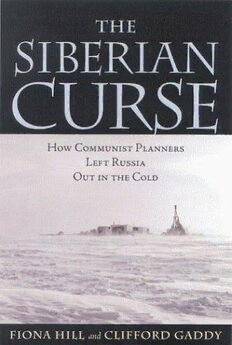Download The Siberian Curse: How Communist Planners Left Russia Out in the Cold PDF Free - Full Version
Download The Siberian Curse: How Communist Planners Left Russia Out in the Cold by Fiona Hill, Clifford G. Gaddy in PDF format completely FREE. No registration required, no payment needed. Get instant access to this valuable resource on PDFdrive.to!
About The Siberian Curse: How Communist Planners Left Russia Out in the Cold
This is a provocative look at a problem that has been overlooked since the collapse of the Soviet Union. Using economic statistics, economic geography, and history, the book argues that what traditionally has been perceived as one of Russia's major strengths - its enormous size - is in fact its greatest weakness. The authors describe how years of forcing people and economic activity out into the vast, resource-rich, but inhospitably cold, territory of Siberia has burdened Russia with huge problems and costs. Defying nature as well as the market, the Bolsheviks forcibly industrialized the gigantic landmass they inherited from the Tsars in 1917. They deployed slave labour to build factories and cities and operate industries in some of the most forbidding places on the planet. They then used costly incentives to attract new workers when the prison camps closed. Today, people and factories languish in places communist planners put them - not where market forces would have attracted them. The book explains why this problem was not rectified in the 1990s and why it is likely to persist. Russian leaders still see Russia's future prosperity as intimately linked to Siberia and its resources. They focus on Siberian redevelopment rather than resettlement to the warmer, western regions of the country. The authors conclude by considering ways in which Russian leaders should rethink the relationship between Russia, its economy, and its territory, especially Siberia.
Detailed Information
| Author: | Fiona Hill, Clifford G. Gaddy |
|---|---|
| Publication Year: | 2003 |
| ISBN: | 815736444 |
| Pages: | 327 |
| Language: | English |
| File Size: | 2.886 |
| Format: | |
| Price: | FREE |
Safe & Secure Download - No registration required
Why Choose PDFdrive for Your Free The Siberian Curse: How Communist Planners Left Russia Out in the Cold Download?
- 100% Free: No hidden fees or subscriptions required for one book every day.
- No Registration: Immediate access is available without creating accounts for one book every day.
- Safe and Secure: Clean downloads without malware or viruses
- Multiple Formats: PDF, MOBI, Mpub,... optimized for all devices
- Educational Resource: Supporting knowledge sharing and learning
Frequently Asked Questions
Is it really free to download The Siberian Curse: How Communist Planners Left Russia Out in the Cold PDF?
Yes, on https://PDFdrive.to you can download The Siberian Curse: How Communist Planners Left Russia Out in the Cold by Fiona Hill, Clifford G. Gaddy completely free. We don't require any payment, subscription, or registration to access this PDF file. For 3 books every day.
How can I read The Siberian Curse: How Communist Planners Left Russia Out in the Cold on my mobile device?
After downloading The Siberian Curse: How Communist Planners Left Russia Out in the Cold PDF, you can open it with any PDF reader app on your phone or tablet. We recommend using Adobe Acrobat Reader, Apple Books, or Google Play Books for the best reading experience.
Is this the full version of The Siberian Curse: How Communist Planners Left Russia Out in the Cold?
Yes, this is the complete PDF version of The Siberian Curse: How Communist Planners Left Russia Out in the Cold by Fiona Hill, Clifford G. Gaddy. You will be able to read the entire content as in the printed version without missing any pages.
Is it legal to download The Siberian Curse: How Communist Planners Left Russia Out in the Cold PDF for free?
https://PDFdrive.to provides links to free educational resources available online. We do not store any files on our servers. Please be aware of copyright laws in your country before downloading.
The materials shared are intended for research, educational, and personal use in accordance with fair use principles.

